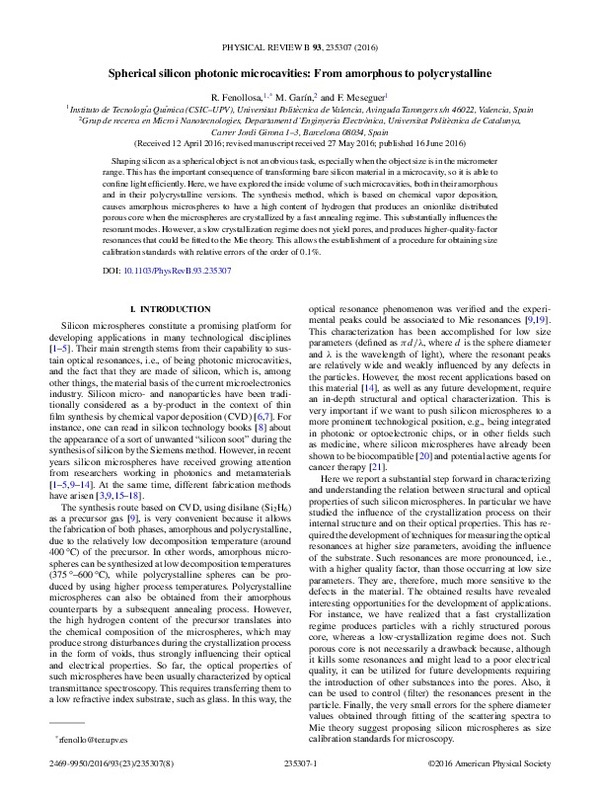Fenollosa Esteve, R.; Garín Escrivá, M.; Meseguer Rico, FJ. (2016). Spherical silicon photonic microcavities: From amorphous to polycrystalline. Physical review B: Condensed matter and materials physics. 93(23):235307-1-235307-8. https://doi.org/10.1103/PhysRevB.93.235307
Por favor, use este identificador para citar o enlazar este ítem: http://hdl.handle.net/10251/84547
|
Título:
|
Spherical silicon photonic microcavities: From amorphous to polycrystalline
|
|
Autor:
|
 Fenollosa Esteve, Roberto
Garín Escrivá, Moisés
Fenollosa Esteve, Roberto
Garín Escrivá, Moisés
 Meseguer Rico, Francisco Javier
Meseguer Rico, Francisco Javier
|
|
Entidad UPV:
|
Universitat Politècnica de València. Centro de Tecnologías Físicas: Acústica, Materiales y Astrofísica - Centre de Tecnologies Físiques: Acústica, Materials i Astrofísica
|
|
Fecha difusión:
|
|
|
Resumen:
|
[EN] Shaping silicon as a spherical object is not an obvious task, especially when the object size is in the micrometer range. This has the important consequence of transforming bare silicon material in a microcavity, so ...[+]
[EN] Shaping silicon as a spherical object is not an obvious task, especially when the object size is in the micrometer range. This has the important consequence of transforming bare silicon material in a microcavity, so it is able to confine light efficiently. Here, we have explored the inside volume of such microcavities, both in their amorphous and in their polycrystalline versions. The synthesis method, which is based on chemical vapor deposition, causes amorphous microspheres to have a high content of hydrogen that produces an onionlike distributed porous core when the microspheres are crystallized by a fast annealing regime. This substantially influences the resonant modes. However, a slow crystallization regime does not yield pores, and produces higher-quality-factor resonances that could be fitted to the Mie theory. This allows the establishment of a procedure for obtaining size calibration standards with relative errors of the order of 0.1%.
[-]
|
|
Palabras clave:
|
Chemical-Vapor-Deposition
,
Dielectric spheres
,
Magnetic response
,
Refractive index
,
Resonances
,
Colloids
,
Region
,
Fabrication
,
Particles
,
Germanium
,
Electron Microscopy Service of the UPV
|
|
Derechos de uso:
|
Reserva de todos los derechos
|
|
Fuente:
|
Physical review B: Condensed matter and materials physics. (issn:
2469-9950
) (eissn:
2469-9969
)
|
|
DOI:
|
10.1103/PhysRevB.93.235307
|
|
Editorial:
|
American Physical Society
|
|
Versión del editor:
|
http://doi.org/10.1103/PhysRevB.93.235307
|
|
Código del Proyecto:
|
info:eu-repo/grantAgreement/MINECO//MAT2015-69669-P/ES/OPTOLECTRONICA EN NANOCAVIDADES DE ALTO INDICE DE REFRACCION. DEL SILICIO A LA PEROVSKITA/
info:eu-repo/grantAgreement/GVA//PROMETEOII%2F2014%2F026/ES/TRANSMISION DE ONDAS EN METAMATERIALES/
info:eu-repo/grantAgreement/MINECO//MAT2012-35040/ES/APLICACIONES BASADAS EN COLOIDES DE SILICIO/
info:eu-repo/grantAgreement/MINECO//ENE2013-49987-EXP/ES//
|
|
Agradecimientos:
|
This work was supported by Projects ENE2013-49987-EXP, MAT2012-35040, and MAT2015-69669-P of the Spanish Ministry of Economy and Competitiveness, and Project PROMETEOII/2014/026 of the Regional Valencian Government. The ...[+]
This work was supported by Projects ENE2013-49987-EXP, MAT2012-35040, and MAT2015-69669-P of the Spanish Ministry of Economy and Competitiveness, and Project PROMETEOII/2014/026 of the Regional Valencian Government. The authors greatly acknowledge the Electron Microscopy Service of the UPV for their valuable help in the structural characterization of the microspheres.
[-]
|
|
Tipo:
|
Artículo
|









